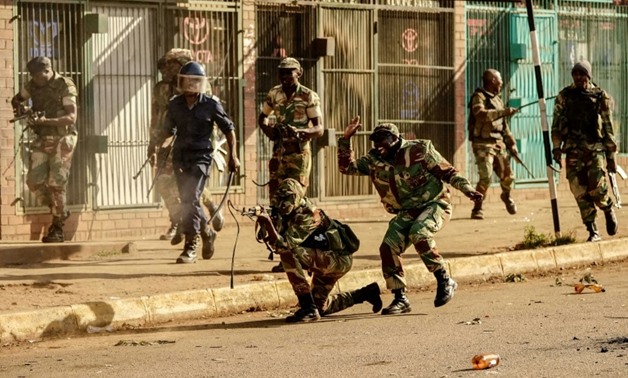
Three people were killed by live fire on Wednesday, spurring international condemnation
3 August 2018: Zimbabwe braced Thursday evening for the results of landmark presidential elections -- the first since the ousting of Robert Mugabe -- which have already sparked a deadly crackdown on protesters.
The Zimbabwe Election Commission (ZEC) said it would begin releasing results of the high-stakes vote at 10 pm (2000 GMT).
Downtown Harare was unusually quiet a day after six people were killed when troops fired live rounds against demonstrators alleging the vote had been rigged.
Soldiers and police cleared the city centre, shouting at pedestrians and traders to leave, as the opposition Movement for Democratic Change (MDC) continued to charge that the ruling ZANU-PF had stolen the election.
"What they have been trying to do of late is to play around," MDC leader Nelson Chamisa told reporters.
"That is rigging, that is manipulation, trying to bastardise the result, and that we will not allow."
The government has accused the MDC of inciting Wednesday's unrest and vowed to enforce a security clampdown.
Soldiers stood guard at ZANU-PF headquarters on Thursday, while armoured personnel carriers, water cannon trucks and police anti-riot vans took position outside MDC headquarters.
- Turning a page -
Monday's vote was meant to turn the page on years of brutal repression under Mugabe.
It has pitted 75-year-old President Emmerson Mnangagwa, Mugabe's former ZANU-PF ally, against Chamisa, 35 years his junior.
While the government warned that further protests would not be tolerated, Mnangagwa also said on Twitter that he wanted an independent investigation into the killings, and that he sought to settle differences "peacefully".
But Chamisa racheted up the pressure, accusing the government of turning tanks and guns on voters, and ruling out the prospect of a unity government.
"No unity government. There has to a government of the people elected by the people," he told reporters.
In official results from the parliamentary election, also held on Monday, ZANU-PF won easily -- suggesting Mnangagwa would be on course to retain the presidency.
Mnangagwa had promised a free and fair vote after the military ushered him to power when Mugabe was forced to resign.
A credible and peaceful vote was meant to end Zimbabwe's international isolation and attract foreign investment to revive the shattered economy.
Election observers from the Commonwealth issued a statement Thursday to "denounce the excessive use of force against unarmed civilians".
"It's disappointing -- the government's reaction only made things worse. It was heavy-handed," trader Timie Manuwere, 37, told AFP.
"But I didn't expect things to really change much with the elections. It was highly unlikely these guys would just give up power after eight months."
Former colonial power Britain appealed for Zimbabwe to remove the army from the streets.
Before the violence, European Union observers declared they found an "un-level playing field and lack of trust" in the election process.
- History of election violence -
Under Mugabe, elections were often marred by fraud and deadly violence.
Of 210 parliamentary seats, 207 have been counted with ZANU-PF winning 144 and the MDC Alliance just 61.
ZEC chairwoman Priscilla Chigumba, a high court judge, has flatly rejected allegations of bias and rigging.
Mugabe, 94, voted in Harare on Monday alongside his wife Grace after he stunned observers by calling for voters to reject ZANU-PF, his former party.
The campaign and polling day were lauded as relatively peaceful and open.
Mnangagwa was the clear election front-runner, benefitting from tacit military support and state resources. But Chamisa, a lawyer and pastor, sought to tap into the youth and urban vote.
Mnangagwa was allegedly involved in violence and intimidation during the 2008 elections when then opposition leader Morgan Tsvangirai pulled out of the run-off after attacks claimed the lives of at least 200 of his supporters.
If no presidential candidate wins at least 50 percent of the ballots cast in the first round, a run-off is scheduled for September 8.

Comments
Leave a Comment